
Turning Off Two Factor Authentication On Apple iPhone 14? 5 Tips You Must Know

Turning Off Two Factor Authentication On Apple iPhone 14? 5 Tips You Must Know
Apple has produced one of the most consumed, acknowledged, and preferred smartphones that allowed them to rule the industry for a considerably long period of time. Their style and presentation were not the only reason that made people look forward to buying an iPhone. Apple created its own operating system and presented their own versions of security and protection. One of the most recognized and impeccable features offered by Apple in its innovative structure was the security and safety through Apple ID and Apple Account. Every important feature that operated throughout the Apple iPhone 14 or iPad was focused over a single entity, the Apple ID. However, apart from the Apple ID, there were several other layers of authentications and verifications that were added throughout the protocol structure. A couple of them are renowned as Two Factor Verification and Two Factor Authentication. This article produces a very generous set of advice that should be looked over while handing these layers of protection. To get a better understanding of the procedures involved, you need to look over the guide to gain better knowledge on how to turn off Two Factor Authentication on your Apple.

Part 1. Is two-step verification the same as two-factor authentication?
There might be a few differences involved in these two security models; however, it should be kept in mind that they focus their purpose on securing the Apple ID of the user. Two Factor Verification is a security protocol that protects access to the various activities performed through the Apple ID. It attenuates an extra verification step across the Apple iPhone 14 device in addition to the password for the Apple ID. The device receives a verification code from an authentication factor that allows the authorities to confirm the credibility of the user.
The Two Factor Authentication is considered as an upgrade to the Two Factor Verification, which was released two years after the Two Factor Verification, in 2015. This authentication method exempted the offline recovery keys and application-specific passcodes. They added a six-digit authentication code onto the original password and produced an offline, time-dependent code that is to be generated through the Settings of the trusted device of the user. This feature was appended into the iOS 9 and OS X El Capitan with a region-specific target.
Part 2. How to turn off two-step verification?
As you are aware of the Two-Step Verification process, it is quite easy and typical in configuring. However, when it comes to turning the settings off, it is also a simple and straightforward procedure that can be easily covered by following the steps provided below.
Step 1: You are required to open the Apple ID Account web page on your browser and sign in with your Apple ID credentials.
Step 2: As you log into the website, access the “Security” section, and tap “Edit” from the options provided on the list.
Step 3: Tap on the “Two-Step Verification” option and turn it off. Confirm to conclude the process. You may be required to select the new security questions and verify the data of birth in the process. As you would be done with it, an email would be received across your connected address for confirmation.
Part 3. How to turn off two-factor authentication? (lower than iOS 10.3)
Two Factor Authentication cannot be turned off in a few cases and accounts for iOS versions greater than 10.3. However, if you have activated Two Factor Authentication across the iOS versions lower than 10.3, you can deactivate the feature through a series of simple steps. The exemption of this security feature across your device leaves it protected only through a password and a few security questions. For turning off the Two Factor Authentication from your Apple device, you need to follow the steps provided as follows:
Step 1: Open your browser and access your Apple ID Account website. Provide the details of your Apple ID and log in.
Step 2: Tap on “Edit” in the “Security” section and turn off the “Two Factor Authentication” option.
Step 3: This would lead you to set new security questions for the Apple ID account, followed by a verification of your date of birth. The successful execution of the process would lead to turning it off.
Part 4. Why can’t you turn off two-factor authentication if you already use it? (iOS 10.3 and later)
For users who have an Apple device with an iOS 10.3 or later version, they cannot turn the Two Factor Authentication off after it is accessed. The latest iOS and macOS included extra layers of security in their features, which led towards a better security foundation and protection of information. Users who have updated their account information can unenroll in two weeks after updating. For this, you are required to simply access the confirmation email that you have received and tap on the link to approach the previous security settings. Thus, it makes it far more than impossible for users to turn their Two Factor Authentication off if they consider it unnecessary for their device. This feature is something that would always remain intact with their device as an extra layer of security. Its absence does leave a chance of illegal access to the Apple iPhone 14 device and an increased risk of a security breach. Since it is directly built across the Apple iPhone 14 device and its settings, this makes it a very hard-to-approach characteristic.
Part 5. How to turn off two-factor authentication by removing Apple ID
Users who are very reluctant to remove the two-factor authentication off their device can consider removing the Apple ID itself for fulfilling the purpose. However, when it comes to executing such tasks, the need for a third-party platform gets evident. Third-party platforms provided dedicated services in providing users with a unique platform of operation with an environment that suits their purpose perfectly. Many platforms provide such impressive services, yet the selection gets quite difficult for a series of reasons. The following pointers explain the reasons to the users over why they should focus on selecting a platform such as Dr. Fone – Screen Unlock (iOS) for this purpose.
- You need to have no excessive knowledge of handling the platform.
- You can cover all the dynamics of unlocking the Apple iPhone 14 device without the use of iTunes.
- The platform provides you with the ability to unlock the passcode of your Apple device with ease.
- It offers you to protect your device from the disabled state.
- Works across all models of iPhone, iPad, and iPod Touch.
- Provides services to the latest version of iOS.
Dr. Fone – Screen Unlock (iOS) makes it easy for the users to control and remove their Apple ID and disable the two-factor authentication across their device. However, when it comes to controlling the platform, it follows a few simple and efficient steps that would guide you in executing the task successfully.
Step 1: Connect your Device and Launch Application
You need to connect your Apple device with the desktop and launch Dr. Fone across the computer. Tap on the “Screen Unlock” tool present on the home window and proceed with the removal of two-factor authentication.

Step 2: Access Appropriate Option
On the next screen that opens, you are required to select “Unlock Apple ID” from the three options. Proceed to your Apple device to take the process further.
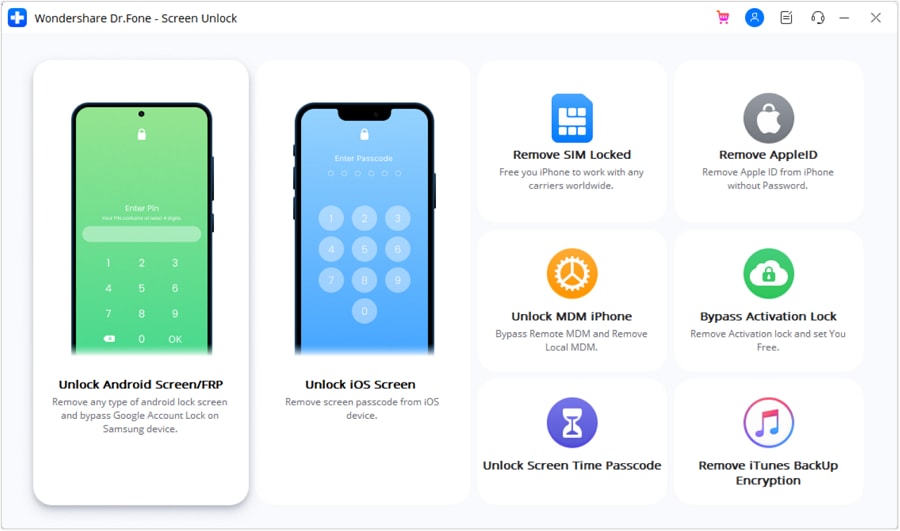
Step 3: Trust the Computer
Open the Apple iPhone 14 device and tap on “Trust” over the prompt that appears on the screen. Following this, you need to navigate to the Settings of your device to initiate a reboot.
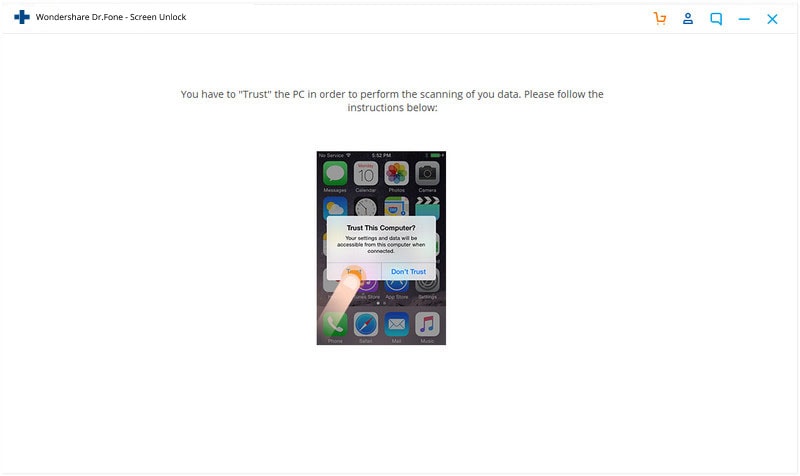
Step 4: Execution of Process
Once you are done with initiating a reboot, the platform automatically detects the update in the process and initiates removing the Apple ID from the Apple iPhone 14 device. Once the platform is done with the process, it provides a prompt message in the next window displaying the execution of the removal of Apple ID from your device. This also removes the Two Factor Authentication off your device.
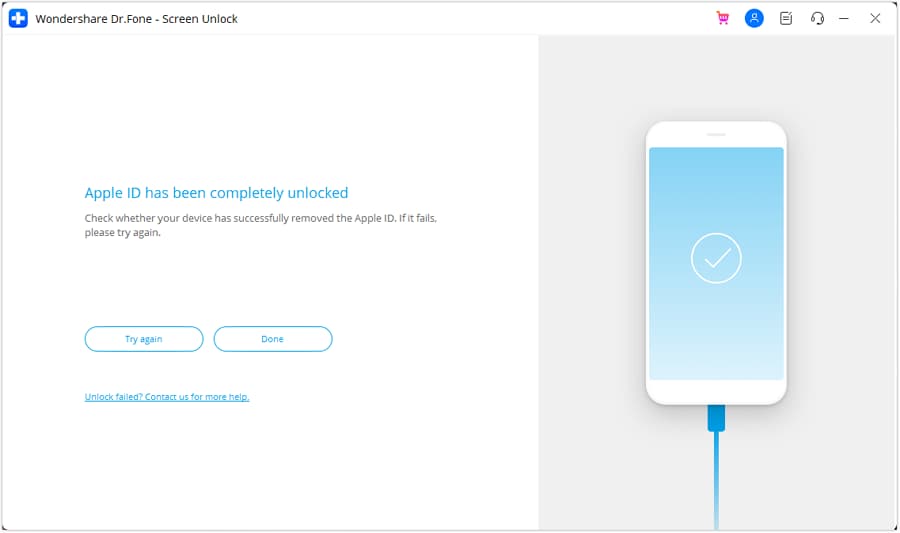
Conclusion
The article has presented a very detailed comparison of the Two Factor Verification and Two Factor Authentication and provided an elaborated discussion over how to turn these security features off their devices. The article also discussed a third-party platform that would guide in removing such security features of the Apple iPhone 14 devices over the requirement of the user. You need to go through this article to get a better knowledge of the execution of the mechanism.
iCloud Separation: How To Disconnect Apple iPhone 14 and iPad
Managing your iCloud is important to maintain the security of your Apple devices. Your iCloud account is the central hub for your photos, documents, contacts, and more. It’s essential to ensure that your devices are safe and secure. However, there are scenarios when you might want to remove it.
The page below will guide you on how to disconnect your Apple iPhone 14 from iCloud. It highlights the benefits of having full control over your data. Below, you can learn how to disconnect from iCloud,keeping your data organized and secure. Explore the article to learn more.
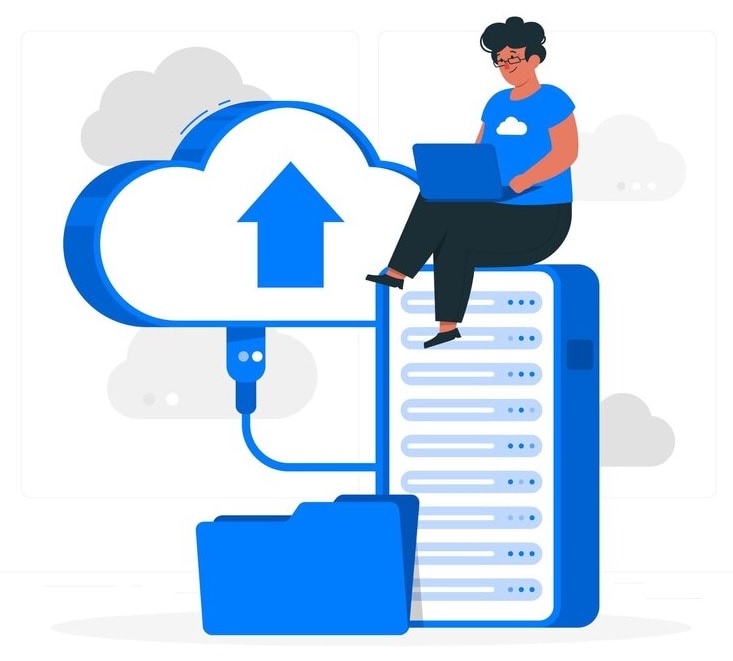
Part 1. Why Disconnect From iCloud?
iCloud is one of the most integral parts of the Apple ecosystem. It syncs your data across devices and ensures a connected digital experience. Yet, there are times when disconnecting from iCloud is necessary. Below are some specific reasons why you should learn how to disconnect your iPad/iPhone from iCloud.
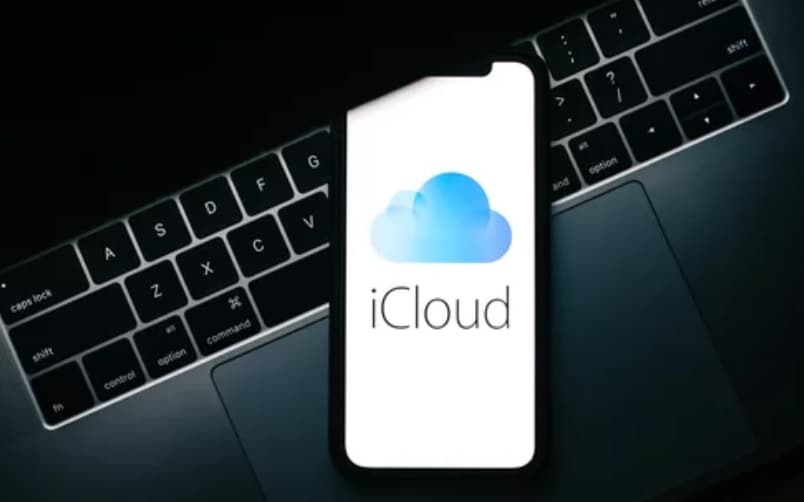
Privacy Concerns
Privacy is an important concern in today’s digital age. Disconnecting from iCloud can provide a layer of security. It prevents sensitive information like photos, contacts, and documents from being stored in the cloud. This is important if you prefer to maintain complete control over your data.
Selling or Giving Away Your Device
When you decide to sell or give away your Apple iPhone 14 or iPad, it’s essential to disconnect it from iCloud. Failing to do so could allow the new owner access to your data. Disconnecting ensures your device is wiped clean of your iCloud information, protecting your privacy.
Limited Storage Space
Apple offers a limited amount of free iCloud storage. If you’ve reached or exceeded your storage quota, disconnecting certain devices can help free up space. It can also prevent annoying notifications about running out of storage and keep your backups and documents accessible.
Changing Apple ID
If you decide to change your Apple ID for any reason, disconnecting from iCloud is necessary. This operation allows you to reconnect your old ID to a new one if necessary. It ensures that all purchases, app downloads, and data are linked to the new ID.
The benefits of disconnecting from iCloud include enhanced security and privacy. Disconnecting your iCloud account can also lead to reduced usage. It’s great for users who want more control over their data or prefer to keep their devices offline.
Part 2. Disconnect iPhone/iPad From iCloud Through 6 Manners
Learning how to disconnect aniPhone or iPad from iCloudcan be necessary for various reasons. To guide you through the process, here are six methods to do so.
Use Settings To Access iCloud
- Step 1: Open the Settings app on your Apple iPhone 14/iPad. Next, tap your name at the top, where your Apple ID is listed.
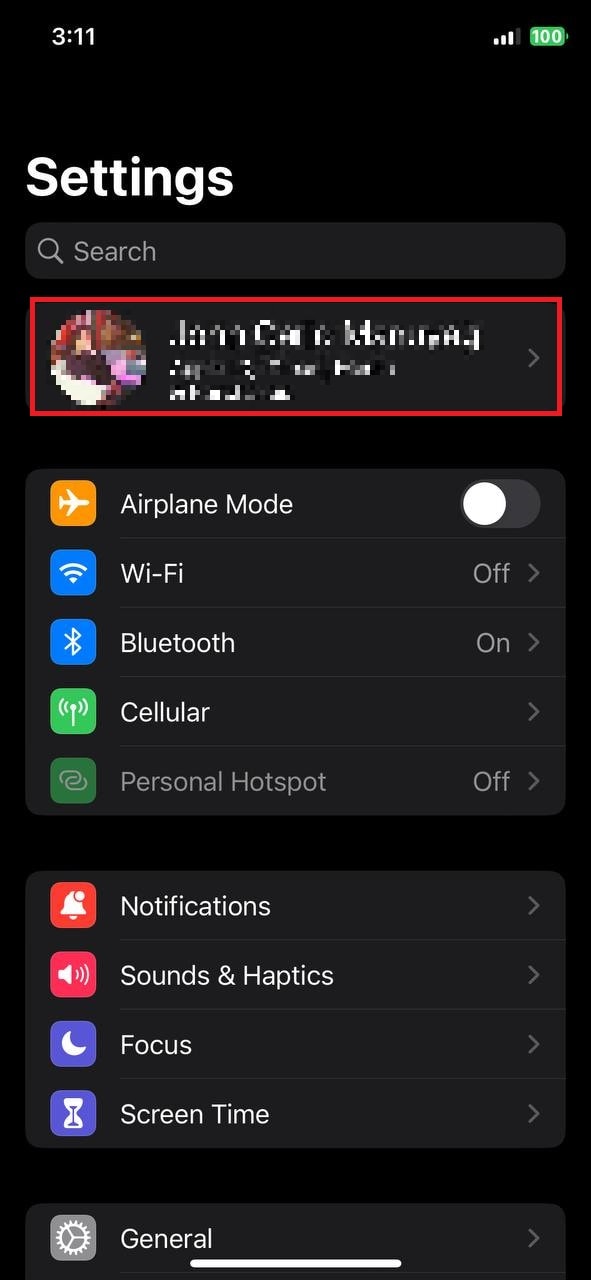
- Step 2: Scroll down and tap Sign Out. When prompted, type in your Apple ID and password. Next, choose TurnOff for the data you want to keep on your device. Afterwards, your Apple iPhone 14 or iPad is now disconnected from iCloud.
Visit iCloud.com
You can also remove your iCloud account on your Apple iPhone 14/iPad by visiting the iCloud.com website. Here’s how.
- Step 1: Launch a web browser on your computer or another device. Visit iCloud.com and sign in with your Apple ID.
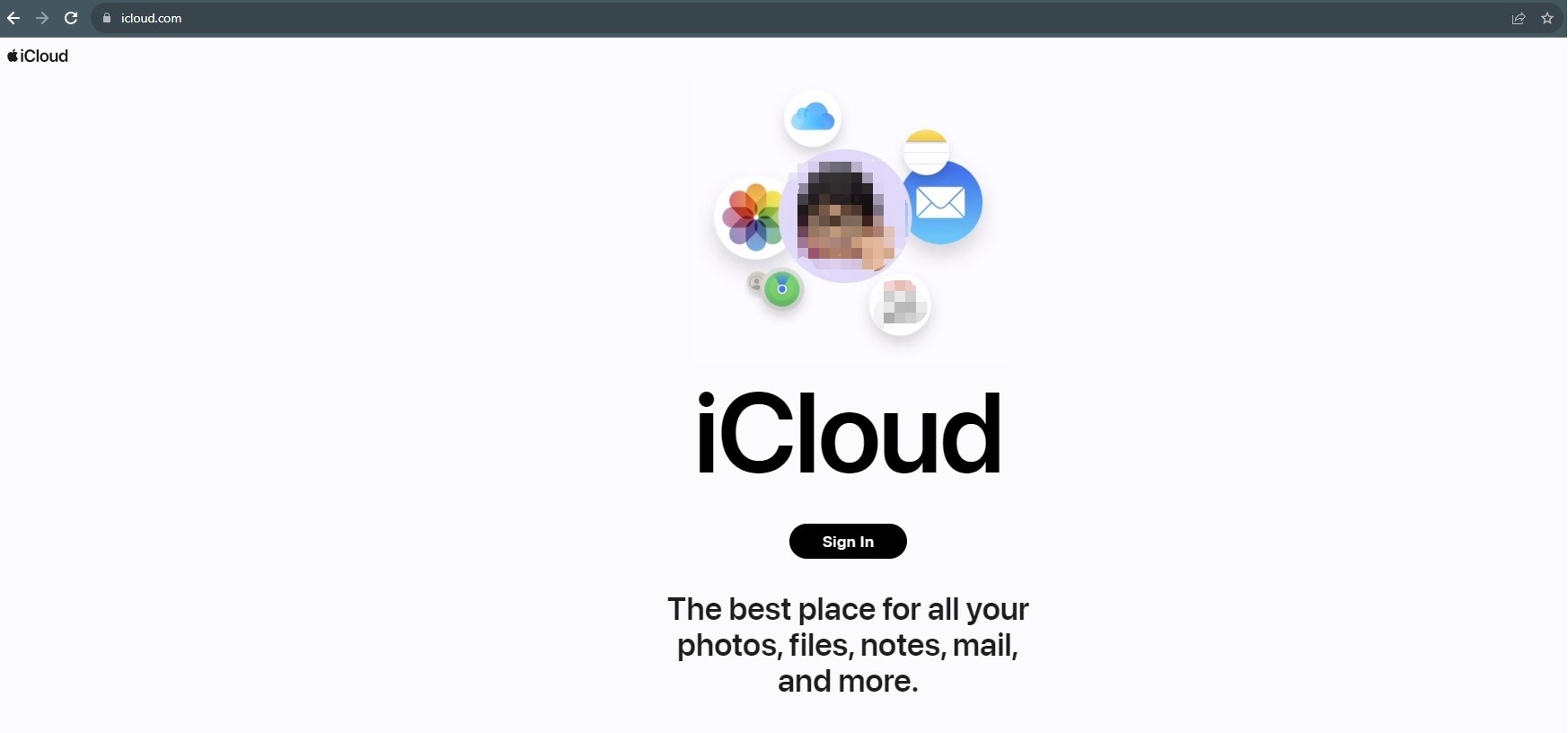
- Step 2: Click AccountSettingsin the interface and scroll down. Choose the option to Sign Out of All Browsers. Next, confirm your choice to disconnect your iCloud from your Apple iPhone 14 or iPad.
Factory Reset
Performing a factory reset can cause all data on your device erased, effectively disconnecting it from iCloud. Here’s how.
- Step 1:Go to your device’s Settings. Next, tap on General> Reset. ChooseErase All Content and Settings.
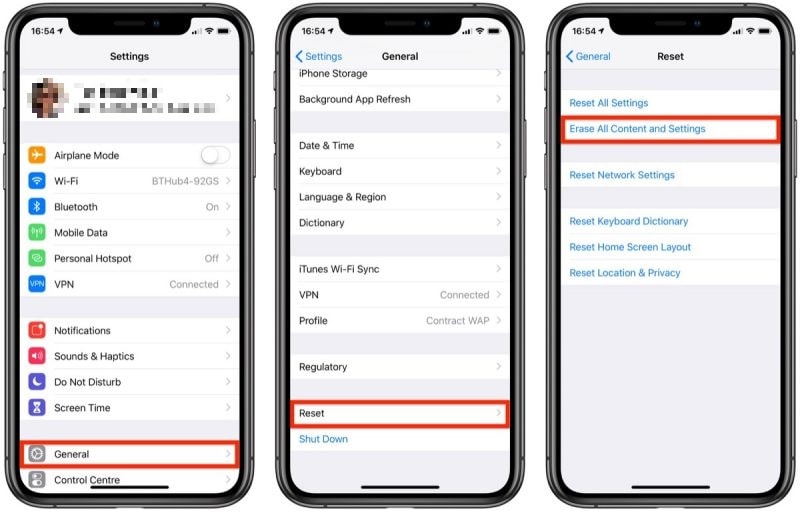
- Step 2: You’ll be prompted to enter your passcode and Apple ID password. Enter your details and confirm the reset.
Note
Be cautious with this method, as it will erase all data on your device.
Use the Find My App (iOS 13 and later)
You can use the Find My app to remove an iCloud account from a specific device. Here are the steps below.
- Step 1: Open the Find Myapp on your device. Next, tap the Devicestab at the bottom.
- Step 2: Select the Apple iPhone 14 device you want to disconnect. Afterwards, tap Remove This Device. Once you confirm your choice, it will disconnect the Apple iPhone 14 device from an iCloud account.
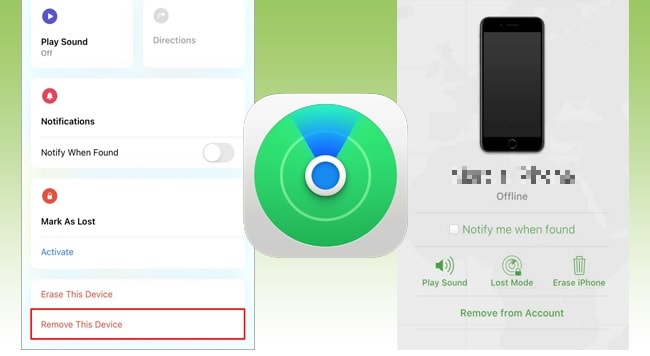
Contact Apple Support
If you encounter issues disconnecting your device from iCloud, contacting Apple support is a wise choice. It’s a good option if you have difficulties using the previous methods. They can guide you through the process and offer personalized assistance.
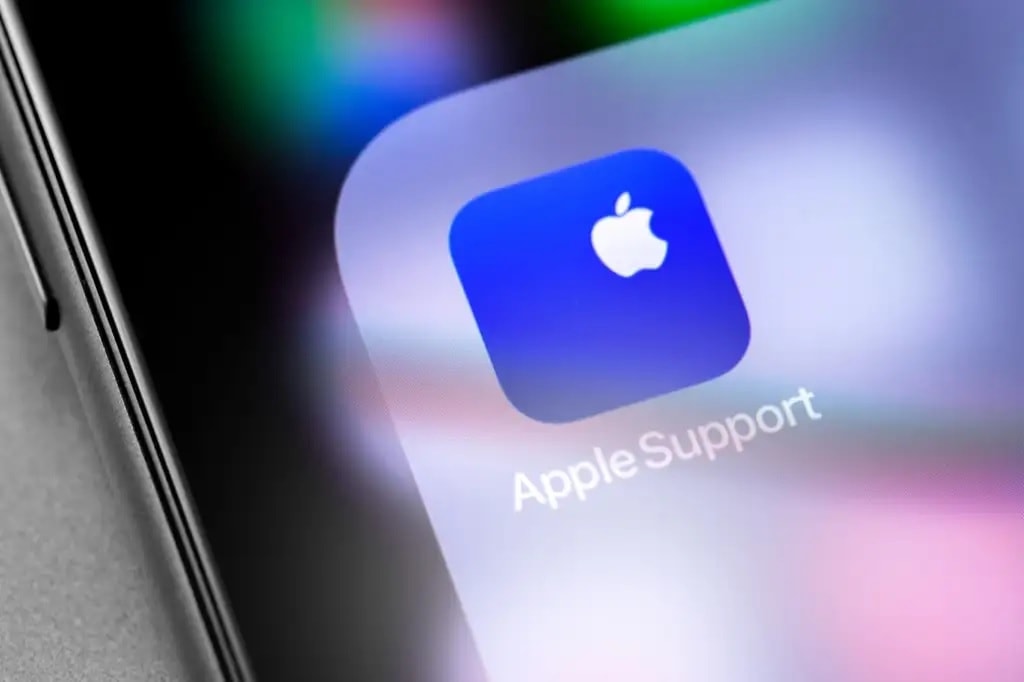
Use a Third-Party Tool
If you’ve tried all the options and even contacted Apple support but still face persistent issues, it might indicate more serious problems. If it detects unusual activity, your Apple iPhone 14 or iPad might trigger iCloud’s Activation Lock. A trusted third-party tool like Wondershare Dr.Fone- Screen Unlock can work wonders in such cases.
Part 3. Steps To Remove iCloud From iPhone/iPad With a Flexible Alternative-Wondershare Dr.Fone
Dr.Fone is a flexible alternative tool that can remove iCloud from your Apple iPhone 14 or iPad. Your Apple iPhone 14 or iPad will most likely trigger iCloud’s Activation Lock if all the steps above do not solve your issue. In that case, Dr.Fone - Screen Unlock can help you bypass it, allowing you to regain control of your device. The steps below show you how to disconnect from iCloudin 3 simple steps.
- Step 1: Start by downloading and installing Dr.Fone on your computer. Once installed, launch the program. Click Toolbox> ScreenUnlock> iOSto move on to the next process.

- Step 2: On the next window, select iCloud Activation Lock Removal to initiate the process. Next, connect your Apple iPhone 14/iPad to the computer with a USB cable. Wait for Dr.Fone to recognize your device, and it will lead to the next screen.
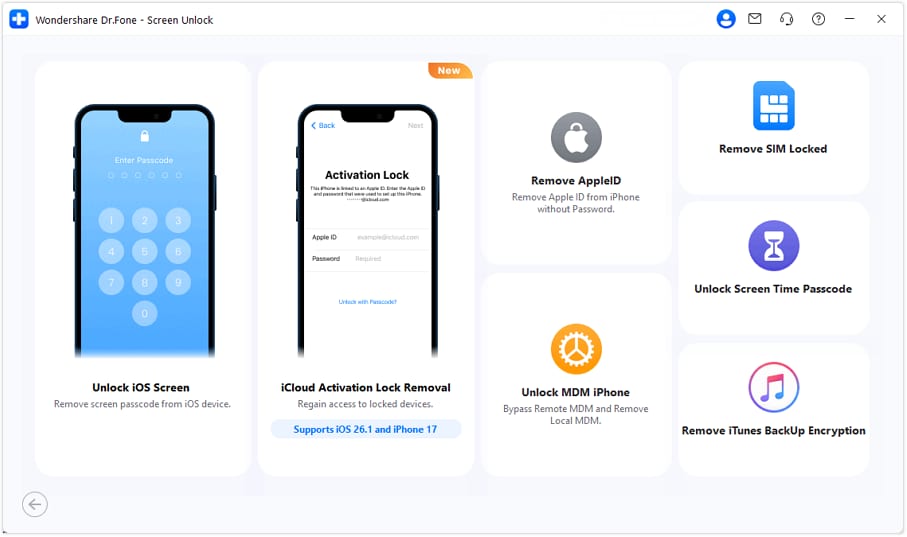
- Step 3: Follow the next on-screen instructions. Afterwards, Dr.Fone will automatically remove the ActivationLockdisplayed under the progress bar.
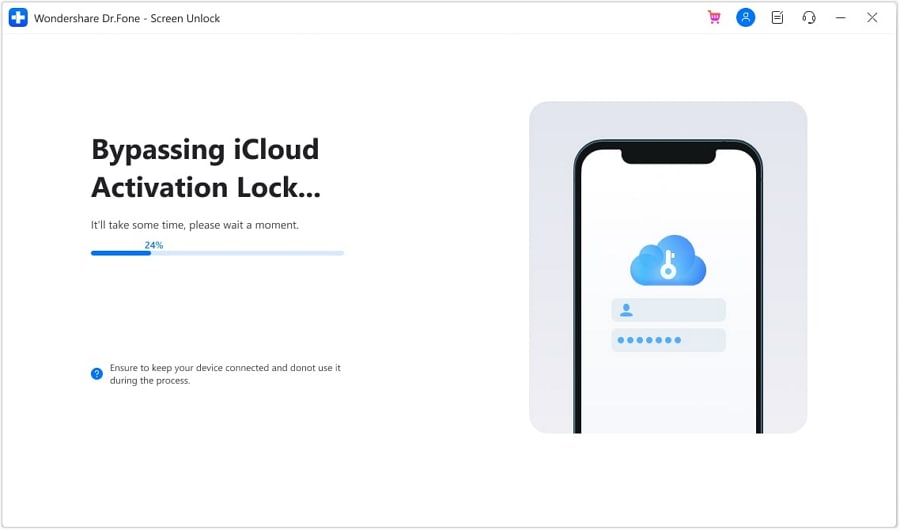
Once the process is completed, you should see the completion message below. Select Done to finish the removal of the iCloud Activation Lock on your Apple iPhone 14 or iPad. A successful process will automatically remove the iCloud on your device.
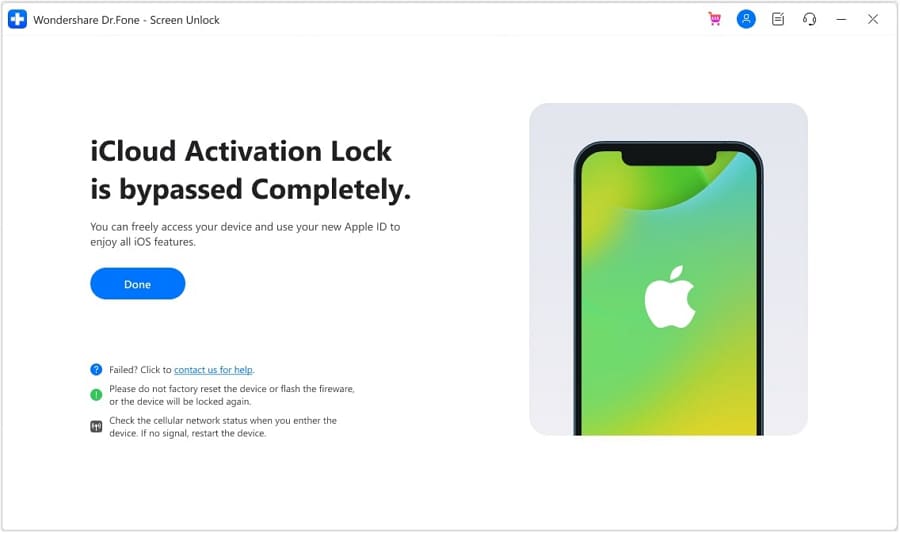
Part 4. How Dr.Fone Can Benefit You in Other Aspect
Dr.Fone goes beyond bypassing the iCloud activation lock. It offers a wide range of essential features that can enhance your device management and data recovery capabilities. Below are some key features that make Wondershare Dr.Fone a reliable tool.
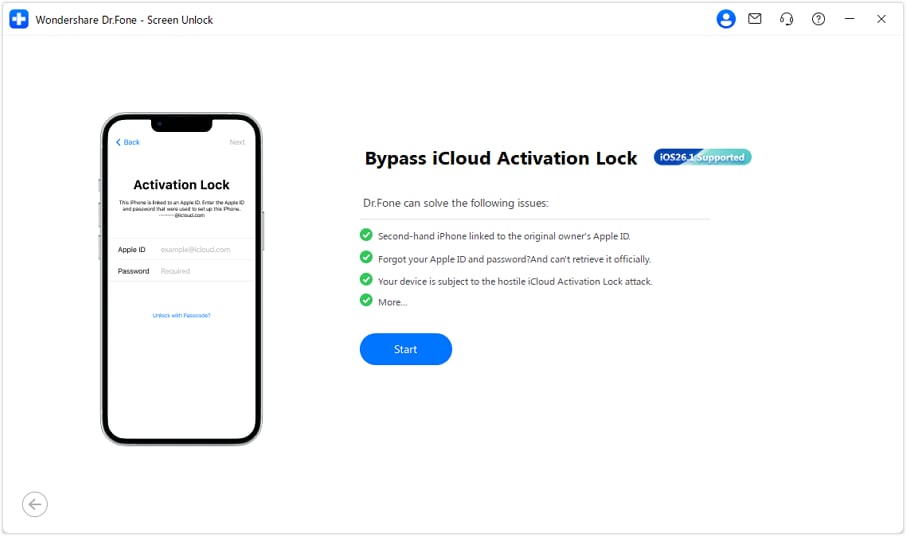
- Unlock Apple ID without a Password. Dr.Fone allows you to unlock your Apple ID without needing a password. The feature is helpful if you’ve been locked out of your account or face authentication issues.
- **Remove SIM Lock/Phone Carrier.**The tool can also remove SIM locks and phone carrier restrictions. This feature allows you to use your device with any carrier or SIM card.
- **No Data Loss.**A crucial advantage of Dr.Fone is its ability to perform all these operations without causing data loss. Your precious data, apps, and settings remain intact throughout the process.
Apart from its iCloud-related capabilities, Dr.Fone offers a comprehensive set of tools for managing your iOS device.
Data Recovery
Dr.Fone can help you recover lost or deleted data. Retrieve your messages, photos, videos, contacts, and more. The feature is a lifesaver when accidental data loss occurs.
Phone Manager
You can manage your device’s data directly on your computer. Transfer files and easily perform tasks like importing, exporting, or deleting content.
Phone Backup
Dr.Fone provides robust backup solutions. The platform allows you to create backups of your device and restore them when needed. It’s an essential part of maintaining the integrity of your data.
Conclusion
Managing your iCloud is essential for maintaining privacy and control over your Apple devices. The various methods on how to disconnect your Apple iPhone 14 from iCloudcater to different scenarios. Whether you disconnect using device settings or the flexibility of third-party tools like Dr.Fone, the choice is yours.
With these options at your disposal, you can tailor your data to meet your specific needs. Always remember that having a handy third-party tool like Dr.Fone can put your data worries at ease. It ensures you have another method of how to disconnect from iCloudfor any iCloud-related concerns.
Apple ID Locked for Security Reasons On Apple iPhone 14? Find the Best Solution Here
Apple ID is the main functional unit in the smooth and secure operation of Apple devices. This ID is the gateway towards many services, including iCloud, App Store, and more. In the context of these security concerns, Apple ID could get locked out for various reasons, like Apple ID locked for security reasons. This happens just because the security feature in the operating system detects some fictitious activity.
However, you don’t need to worry about your Apple ID locked for security reasons because solutions to these problems do exist. In this article, we will also provide one significant and effective solution to tackle such issues effortlessly.
Part 1. Exploring the Causes of Apple ID Locked Out for Security Purposes
Has your Apple ID been locked for security reasons, and is this problem creating some tension for you? Before we move further towards its solutions, it’s essential to know the reasons that lead to these problems. Some of them are explained below in a comprehensive manner:
1. Incorrect Attempts
Apple locks your Apple ID mainly when you or someone else has entered the password incorrectly multiple times. This is one of the most common reasons, and mostly, this happens by the original users themselves unintentionally.
2. Preventing Fraudulence
If there are unauthorized purchases or suspicious transactions on your ID, Apple may consider locking it to prevent that activity. It happens to protect the user’s financial information and to avoid any fraudulent activity from being done on that Apple ID.
3. Using Third-Party Tools
Sometimes, when using third-party tools based on open-source iCloud sources, the Apple ID could get locked. Developers can integrate iCloud features into their applications to provide users with improved accessibility to their iCloud data.
4. Security Breach Reasons
The ID can also get locked when Apple senses a potential security breach, which could lead to the exposure of your credentials. It may occur when someone tries to hack your ID to get some information, especially when it is being used in multiple areas.
5. Incorrect Security Questions
It may be due to the security questions you or someone else has entered incorrectly too many times. This is another common reason because, most often, the security questions are forgotten by the user. Ultimately, this leads to your Apple ID being locked for security reasons.
Part 2. Resolving the Apple ID Locked Out For Security Reasons by Resetting The Password
The basic solution to the Apple ID locked for security reasons is to reset the ID’s password. Apple also recommends adopting this method if you feel any suspicious activity. The password for your Apple ID can be reset from the iOS device itself or the Mac. We are providing a simple guide to reset your password either way.
Resetting Password From iOS Device
Instructions: To reset your Apple ID password using your iOS device, open the “Settings” app and move ahead by tapping on your name in front of you. Then, continue to select the “Sign-In & Security” option and select “Change Password.” Follow the prompts on the screen to complete the Apple ID password change process.
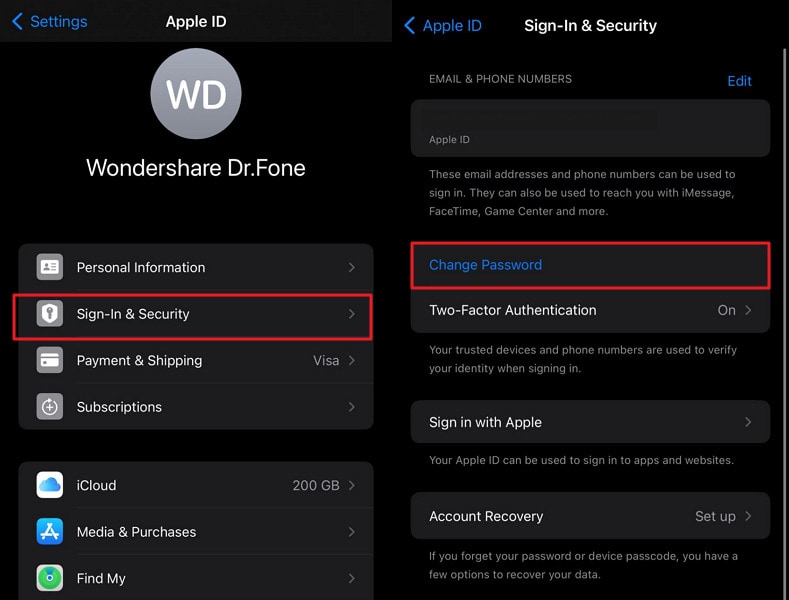
Resetting Password From Mac
Instructions: Start by tapping the Apple logo in the top left corner of your screen and choosing the option “System Settings.” Upon completion of this step, you have to access your Apple ID settings and proceed by selecting the “Sign-In & Security” option. Subsequently, opt for the “Change Password” feature to modify your Apple ID password.
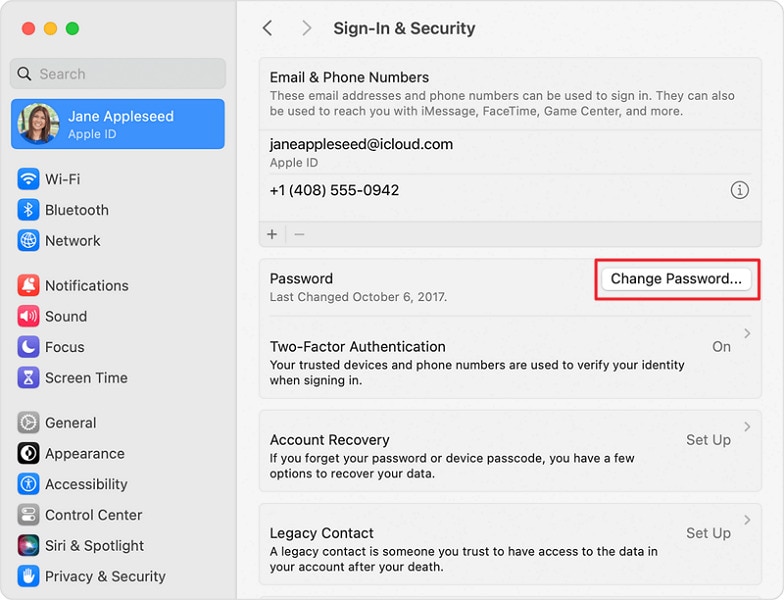
Part 3. Resolving the Apple ID Locked Out for Security Reasons by iForgot Website
You have tried to resolve the problematic message indicating, “This Apple ID has been locked,” but resetting the password is not helping. Then, you need to try iforgot.apple.com, which will help you tackle this issue quickly. Here is how to resolve your Apple ID, which has been locked for security reasons, using the iforgot.apple.com website.
- Step 1: To begin with, you will have to browse the website iforgot.apple.com on your computer. Once the website has loaded, move ahead by pressing the “Reset Password” and selecting the “Continue” option after entering the Apple ID.
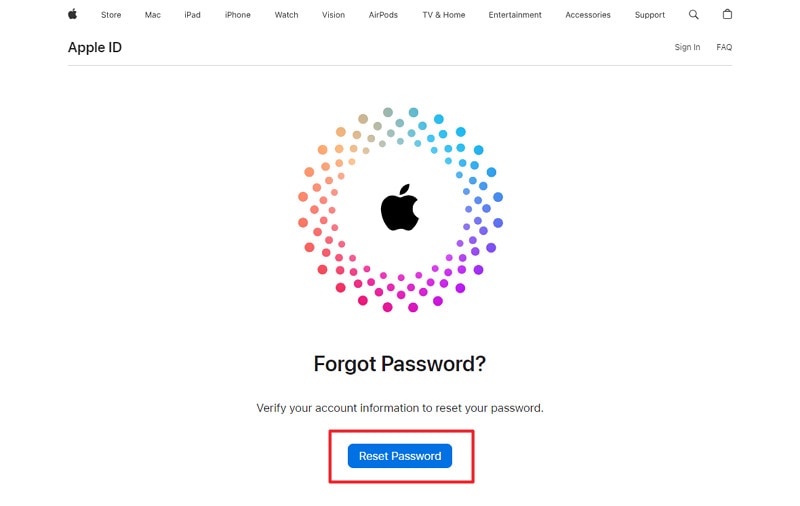
- Step 2: In the next stage, you need to reset your password, and for that, you need to go through a verification process sent to your trusted device. You can reset the Apple ID password by tapping the “Allow” button. Following this, you must provide the trusted device passcode to initiate the password reset process.
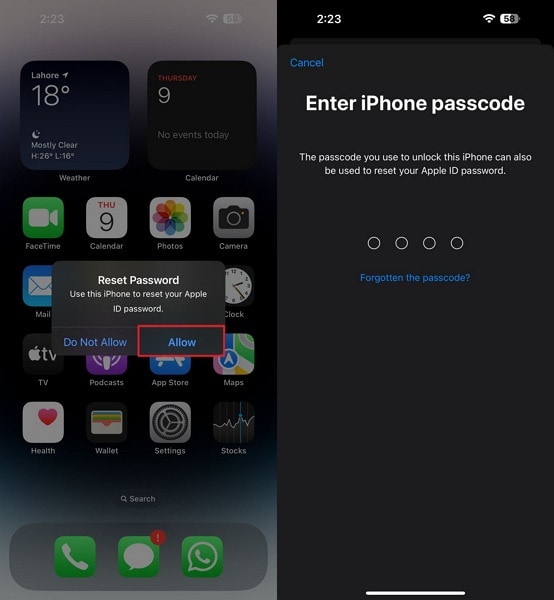
Part 4. Resolving the Apple ID Locked Out for Security Reasons by Apple Support App
If your Apple ID is still inaccessible after implementing the methods, you can try the Apple Support app. This technique can be applied by arranging another device for downloading the Apple Support app. Users can regain access to their Apple ID and restore full device functionality through this app. The simple guide to perform this action is explained below step-wise:
- Step 1: You need to download the Apple Support App on the borrowed device and proceed to open it. After that, navigate to the “Support Tools” section, find the “Reset Password” option, and tap on it.
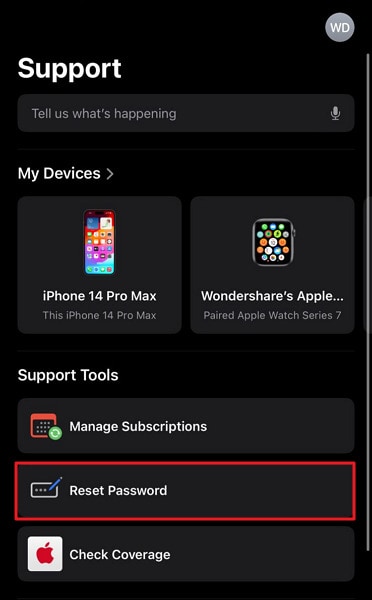
- Step 2: Choose the “Help Someone Else” option to continue. Then, give your Apple ID and hit the “Continue” button. There, you have to follow the on-screen instructions to reset your password and get access to it.
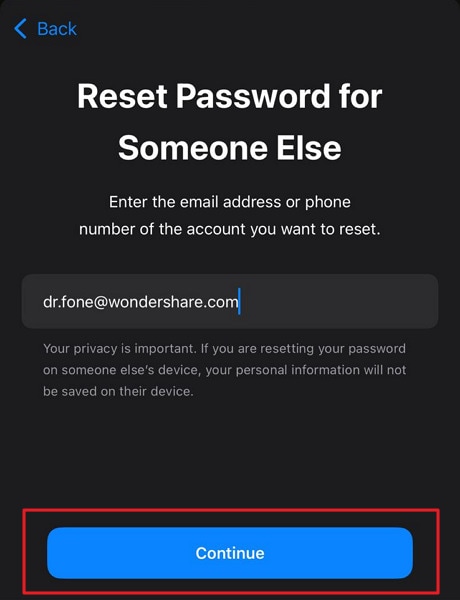
Part 5. No Solution Yet? Try Wondershare Dr.Fone – Screen Unlock (iOS) To Unlock Locked Apple ID for Security Reasons
When facing an Apple ID locked for security reasons, it becomes imperative to seek a reliable solution. All essential operations within iOS devices are intertwined with the functionality of the Apple ID. That’s why a viable resolution is crucial for seamless device usability. In such situations, Wondershare Dr.Fone emerges as a highly effective option.
It is specifically designed to tackle the intricacies of iOS device management. This tool offers a dedicated feature to unlock Apple IDs, making it the ultimate recourse. Additionally, it allows you to bypass the iCloud activation lock without requiring a password. This iOS screen unlock tool is fully compatible with the latest versions of iOS 17 and iPadOS 17.
Key Features of Wondershare Dr.Fone
- Using Wondershare Dr.Fone, you can also remove the Apple ID or screen lock from the latest iPhone 15 models.
- You can also manage your Apple iPhone 14 data transfer or fix iDevice system issues with the help of Wondershare Dr.Fone.
- This tool can also help its users to remove the Screen Time Passcode and SIM lock.
How To Use Wondershare Dr.Fone To Unlock Locked Apple ID for Security Reasons
Summarized below is the detailed step-by-step process of using Wondershare Dr.Fone to unlock your Apple ID:
- Step 1: Navigate to the Remove Apple ID Feature
With Wondershare Dr.Fone launched, move to the “Toolbox” tab and access “Screen Unlock.” Then choose “iOS” as your device type, and on the following screen, press “Remove Apple ID.” Now is the time to connect your Apple iPhone 14 to the computer and let Wondershare Dr.Fone detect it.
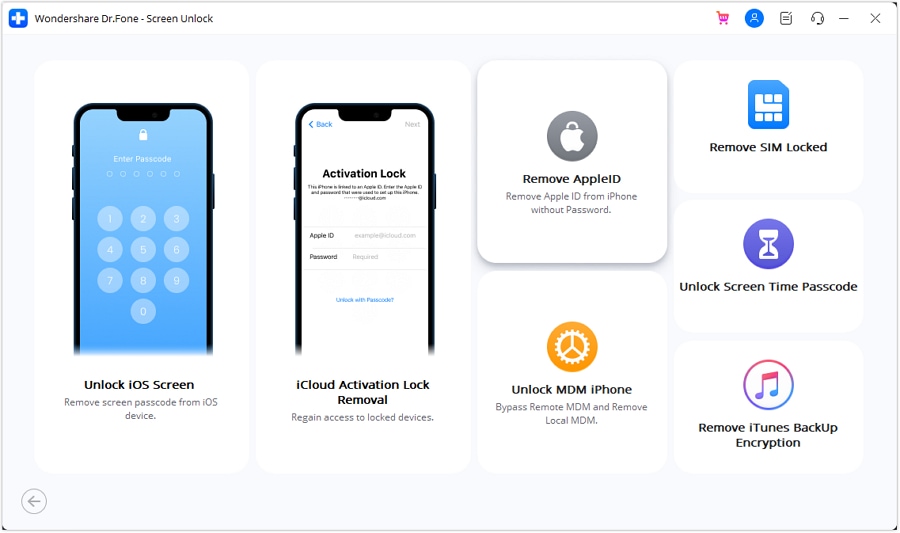
- Step 2: Enable 2FA on Your iOS Device
To proceed further, it is imperative to have screen lock and 2FA enabled on your iOS device. If it already isn’t, do it and move to put your device in Recovery Mode. Dr.Fone will guide you through the process of enabling Recovery Mode on your device. Once Wondershare Dr.Fone detects your device in Recovery Mode, it will display your device model.
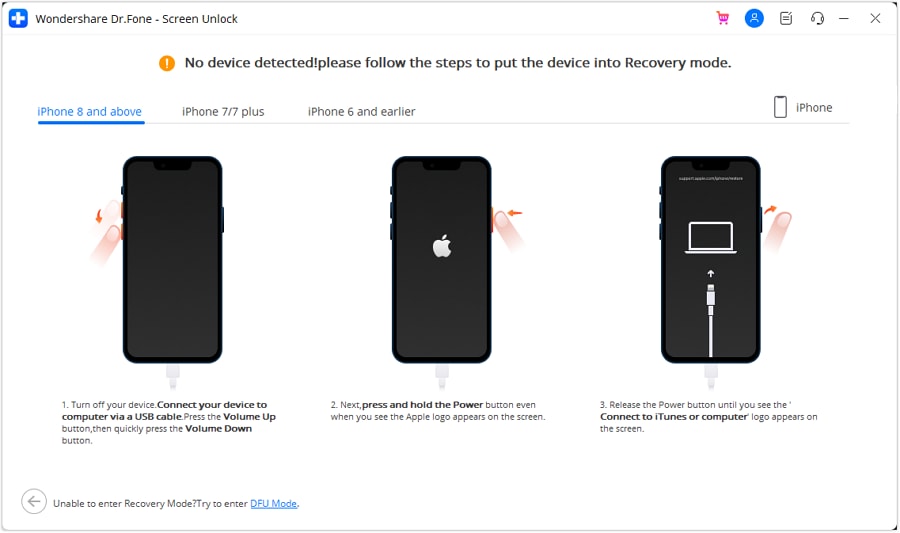
- Step 3: Complete the Apple ID Unlocking Process
Now choose “System Version” and tap “Start” to let Dr.Fone download the firmware. Once it is downloaded and verified, tap “Unlock Now.” The last step involves putting the confirmation code in the confirmation prompt and pressing “Unlock.” In a few moments, Wondershare Dr.Fone will unlock your Apple ID.
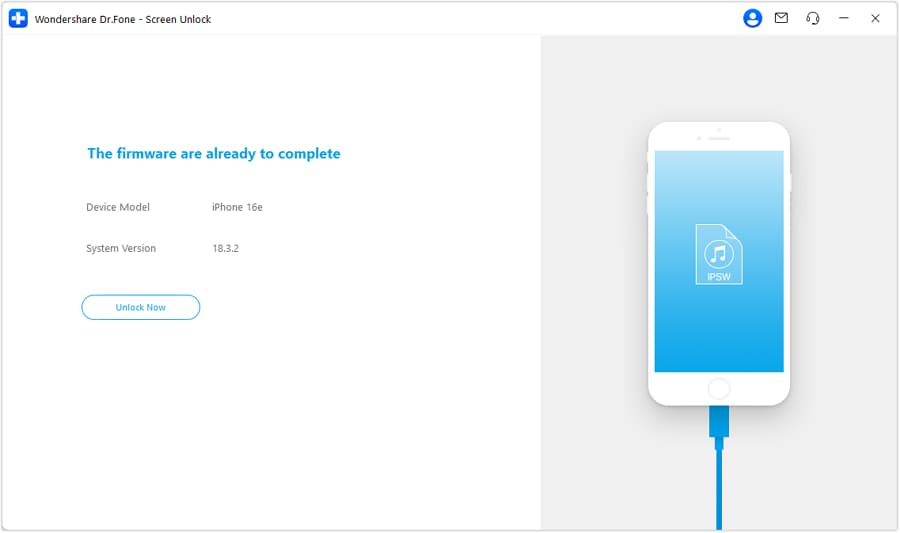
Final Words
To conclude, there are scenarios that can lead to the Apple ID being locked for security reasons problem. Apple does this for your benefit. However, we have explained different methods to get you out of this situation. Although all of these methods possess the potential to resolve this problem, Wondershare Dr.Fone offers a powerful platform for more in-depth remedies.
This robust iOS toolkit feature performs this recovery in seconds, saving you time. Also, it has a simple interface for its users with various technical exposure. In short, it is the best solution if your Apple ID has been locked for security reasons.
Also read:
- [Updated] Leveraging the Power of Creative Commons Rights
- 2024 Approved Leveraging Free LUTs A Pathway to Improved OBS Streaming
- 2024 Approved The Ultimate Collection of Film Scripts by Genre
- Beats & Banners Discovering Premium DJ Templates for 2024
- Can I Remove the Apple Watch Activation Lock By iPhone 6s without the Previous Owner?
- How To Erase an Apple iPhone 8 Plus Without Apple ID Password?
- In 2024, Scriptwriting Essentials for Authentic and Engaging Documentaries
- In 2024, Turning Off Two Factor Authentication On Apple iPhone 12 Pro Max? 5 Tips You Must Know
- Latest AMD RX 6800 XT Drivers for Windows Users (Version Supporting Win 11/10/8/7)
- Tips and Tricks for Apple ID Locked Issue From Apple iPhone 15 Pro
- Your Account Has Been Disabled in the App Store and iTunes From Apple iPhone 7 Plus?
- 무료 MOD AVI 펑션을 쉽고 사용하기위한 웹 공간 내 스타일리시 도구 - Movavi
- Title: Turning Off Two Factor Authentication On Apple iPhone 14? 5 Tips You Must Know
- Author: Alma
- Created at : 2024-10-16 19:08:10
- Updated at : 2024-10-20 19:18:12
- Link: https://apple-account.techidaily.com/turning-off-two-factor-authentication-on-apple-iphone-14-5-tips-you-must-know-by-drfone-ios/
- License: This work is licensed under CC BY-NC-SA 4.0.